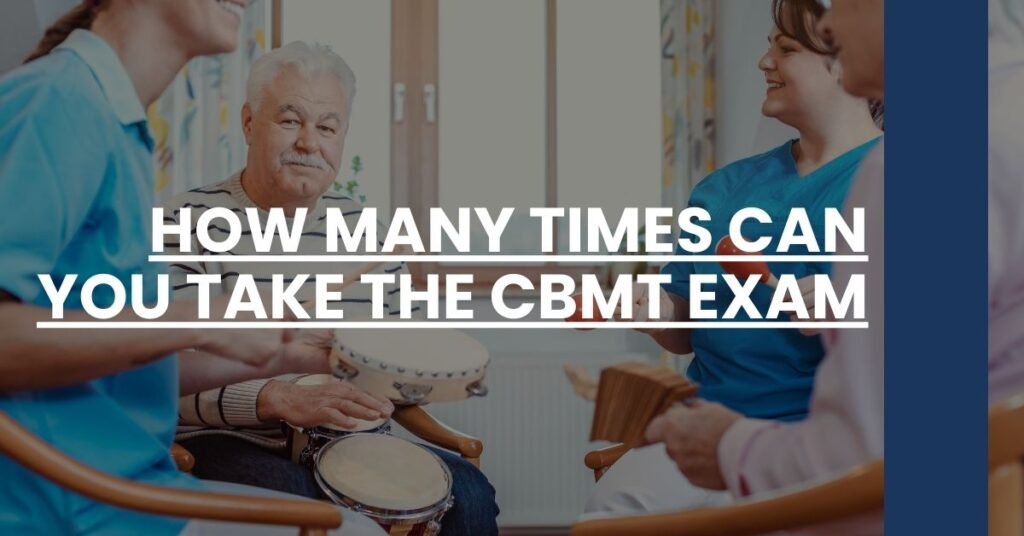Aspiring music therapists can take the CBMT exam multiple times if needed. There’s no limit to the number of times you can attempt to pass, ensuring that candidates have ample opportunity to meet the certification requirements. Between each try, a 30-day waiting period is necessary to prepare for retaking the test. You’ll learn more about the eligibility, preparation strategies, costs, and impact of retaking the exam, all geared towards fostering your success on the path to becoming a board-certified music therapist.
- Eligibility: Understand the academic and clinical training required.
- Preparation Strategies: Useful tips and resources to help you succeed.
- Financial Considerations: Breakdown of the exam costs, including fees for retakes.
- Impact of Retakes: The professional and psychological effects of multiple attempts.
- Introduction
- Understanding the CBMT Exam
- Exam Eligibility Requirements
- CBMT Exam Attempt Policy
- Preparation and Retaking the Exam
- Waiting Period Between Attempts
- Financial Considerations
- Impact of Multiple Attempts
- Success Rates and Statistics
- Support and Resources for CBMT Candidates
- Navigating Failure and Strategizing for Success
- Conclusion
Introduction
Embarking on a career as a music therapist is an exciting journey that culminates in one significant milestone: passing the Certification Board for Music Therapists (CBMT) exam. Achieving board certification is crucial for your professional credentials, and understandably, you might be concerned about the prospects of taking the exam, especially if you don’t succeed on your first try. It’s only natural to wonder: How many times can you take the CBMT exam? In this in-depth exploration, we will guide you through the intricacies of the examination process, providing a clear picture of the attempt policy and crucial insights to help you succeed.
Understanding the CBMT Exam
The CBMT exam is your gateway to becoming a certified music therapist. This rigorous test assesses your understanding of music therapy concepts, clinical skills, and ethical standards necessary to provide quality care. Recognized across the United States, this certification reflects a high level of professional achievement and commitment.
Confronting the exam can be daunting. You’ve poured countless hours into your academic and clinical training, and the thought of not passing can be anxiety-inducing. But worry not; understanding the structure and purpose of the examination will not only alleviate some of that stress but also equip you with the knowledge needed to take the next steps toward your certification.
Exam Eligibility Requirements
Before you can even consider retaking the CBMT exam, it’s essential to ensure you meet the necessary eligibility criteria. Here’s what you need to know:
- Academic Requirements: You must have completed a music therapy degree program approved by the American Music Therapy Association, which encompasses both coursework and clinical training.
- Clinical Training: Practical experience is crucial. You’re required to have completed an internship through an AMTA-approved National Roster or University Affiliated internship site.
- Application Process: The final step in proving your eligibility is submitting an online application with all the required documentation and fees.
For a more detailed understanding of the eligibility requirements, you can refer to the CBMT’s official candidate handbook.
CBMT Exam Attempt Policy
The CBMT understands the pressure and rigor involved in attaining certification. To this end, they have promulgated a policy that is designed to be fair yet ensures the integrity of the examination process. So, how often can you take the CBMT exam?
The simple answer is: as many times as needed. However, conditions apply:
- After each unsuccessful attempt, there is a mandatory waiting period of 30 days before you can retake the exam. This interval allows for further preparation and reflection on the areas that need improvement.
- The necessity to reapply for each attempt remains, including the submission of the required fees and adherence to the application deadlines.
Remember, the aim is not to limit your chances but to bolster your preparedness for ultimately achieving success on the exam.
Preparation and Retaking the Exam
Tackling the CBMT exam, especially if you are considering retaking it, demands a strategic approach to preparation. Here’s how you can enhance your preparation to better your chances for the next attempt:
- Self-Assessment Exams (SAEs): These practice tests simulate the actual exam and are critical for gauging your readiness.
- Study Materials: Utilize the CBMT’s recommended bibliography to guide your studies, ensuring you’re reviewing the essential resources.
For a comprehensive list of preparation materials and Self-Assessment Exams, explore the resources provided by the CBMT.
Waiting Period Between Attempts
You may feel a sense of urgency to jump back into the fray after an initial unsuccessful attempt, but the 30-day waiting period enforced by the CBMT is there for your benefit. Use this time wisely. Reflect on the feedback from your previous exam, identifying areas that need reinforcement, and engage with study groups and additional training resources to fine-tune your knowledge and skills. This period can be a precious time for growth, ensuring that when you do retake the exam, you’re doing so with an improved understanding and greater confidence.
The waiting period also serves a broader purpose: it helps maintain the standard of the profession. By requiring a break between attempts, the CBMT ensures that all certified music therapists have met consistent competencies, preserving the integrity and reputation of the field.
As you utilize this interval to refine your preparation strategy, remain positive and dedicated to your goal. The road to certification may be demanding, but it is also an opportunity for professional and personal development, leading you to become a more adept and proficient music therapist.
Financial Considerations
When preparing to take (or retake) the CBMT exam, it’s crucial to be cognizant of the financial commitments involved. The initial examination fee is $325, and this includes both the exam itself ($275) and a processing fee ($50). If you need to retake the exam, the fee is $275 for each subsequent attempt.
As you map out your budget for potential retakes, consider these additional expenses:
- Preparation Materials: While many resources are free, some materials or courses may require payment.
- Travel and Accommodation: Depending on your location, you might need to factor in the costs of reaching the exam center.
- Time Off Work: If you have to take time off to prepare or sit the exam, consider any lost earnings.
Organizing your finances beforehand can alleviate the stress associated with retaking the exam. Remember, viewing these costs as an investment in your future career can help frame them in a positive light. If budgeting is a concern, start setting aside a little each month well in advance of your exam date. This proactive approach will not only ready you financially but also mentally, as you systematically prepare for success.
For more details on exam fees and costs, you can review the CBMT’s Exam Candidate Handbook.
Impact of Multiple Attempts
It’s understandable to feel a mix of emotions if faced with the need to take the CBMT exam more than once. There’s the potential for disappointment or frustration, but there’s also resilience in choosing to try again. Remember that each attempt is a learning experience and, in your journey to becoming a board-certified music therapist, persistence is key.
Beyond the personal impact, multiple attempts may also have professional ramifications. Colleagues and employers will likely recognize the determination and dedication it takes to persevere. Each effort to pass the CBMT exam underlines your commitment to abiding by the highest standards of your chosen profession.
Keep in mind the broader picture: how many times can you take the CBMT exam is not as crucial as how effectively you capitalize on the experience gained with each attempt. Stay focused on the prize – passing the exam only marks the beginning of what promises to be a rewarding career.
Success Rates and Statistics
Analyzing pass rates can provide insight into the approximate difficulty of the CBMT exam and the likelihood of needing multiple attempts. A decline observed over time in the pass rates, from 84% in 2005–2010 to 70% in 2015-second quarter of 2017, suggests the exam requires ample preparation and a deep understanding of music therapy practices.
However, don’t let statistics dishearten you. They are signposts guiding you towards areas that may need more attention in your studies. Use success rate data to motivate you, knowing that with the proper preparation and resolve, you are fully capable of joining the ranks of board-certified music therapists.
For those interested in delving deeper into these statistics, research on exam pass rates offers a thorough analysis of trends and implications.
Support and Resources for CBMT Candidates
Fortunately, you don’t have to navigate your path to the CBMT exam alone. Numerous resources and support systems are in place to assist you. These include:
- Study Groups: Joining a study group can considerably enhance your preparation. Shared knowledge and collective support make a significant difference.
- Online Forums: Engage with peers and professionals in online communities. Websites and forums related to music therapy offer invaluable advice and camaraderie.
- Professional Guidance: Seek out mentors who have successfully passed the exam for personal insights and tips.
Leveraging these resources effectively can increase your chances of success, potentially reducing the number of times you need to take the CBMT exam. Take advantage of the community around you; it’s an essential asset in your certification journey.
For more support, reference the CBMT’s list of resources designed to aid candidates in their preparation.
Navigating Failure and Strategizing for Success
Facing failure can be disheartening, but it’s an intrinsic part of the journey that in no way defines your ability as a music therapist. If your first (or second) attempt at the CBMT exam doesn’t yield the desired ‘pass,’ reframe it as a roadmap to the areas you need to strengthen.
Here’s how to strategically bounce back:
- Reflect: Take time to understand which sections you found challenging and why.
- Plan: Develop a study schedule that focuses on your weak spots.
- Practice: Utilize practice exams to build confidence and track your improvement.
- Self-care: Remember, taking care of your well-being is as important as studying hard.
View every attempt as a stepping stone. With each one, you’re adding to your expertise, inching closer to that coveted certification.
Conclusion
The path to becoming a board-certified music therapist is a testament to your passion and dedication to your craft. While the CBMT exam can be a hurdle, you now know that you can take it as many times as necessary to succeed – a reflection of the profession’s encouragement for continual growth and mastery.
This guide has walked you through every aspect of preparing, retaking, and succeeding on this crucial certification exam. Keep in mind the financial considerations, the wealth of resources and support systems at your disposal, and most importantly, the resilience you possess that powers your journey.
Now that your question – How many times can you take the CBMT exam? – has been answered, it’s time to focus on the exciting road ahead. Your determination will see you through, and before long, you’ll be inspiring others with your story of persistence and ultimate success.
Discover how many times you can take the CBMT exam, understand retake policies, waiting periods, and preparation strategies for success.

